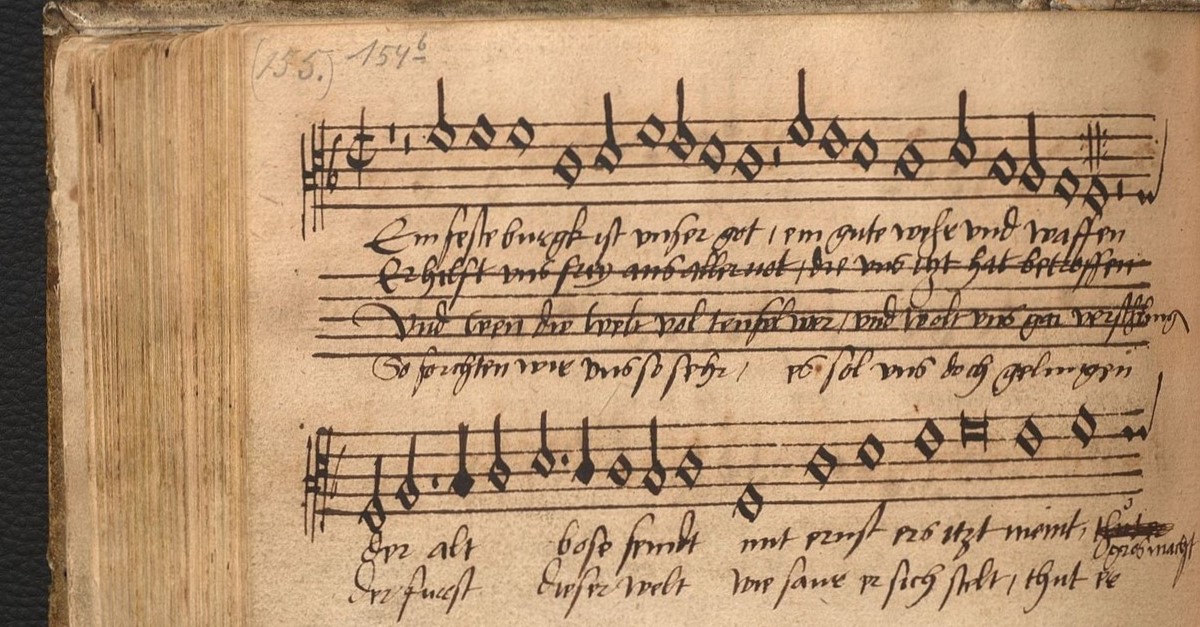
Luther's Battle Hymn
Often called the "Battle Hymn of the Reformation," Martin Luther's "A Mighty Fortress" has been translated into almost every known language, and at least eighty different translations have been made into English!
During times when the Reformation seemed lost, Luther would say to his friend Melanchthon, "Let's sing the Forty-sixth Psalm." "A Mighty Fortress" draws its inspiration from Psalm 46. Luther wrote at least 35 other hymns. As a young student, Luther earned money to pay his school fees by singing in the streets of Eisenach. Luther played the lute, and singing always was an important part of his life.
"A Mighty Fortress" so captured the spirit of the Protestant Reformation that when Protestant emigrants were forced into exile or martyrs went to their death, "A Mighty Fortress" always seemed to be the song they chose to sing.
Aaron Shust - Mighty Fortress (Lyric Video) + FREE SONG DOWNLOAD from aaron-shust on GodTube.
Luther on Music
"Next to the Word of God, music deserves the highest praise. She is a mistress and governess of those human emotions...which control men or more often overwhelm them...Whether you wish to comfort the sad, to subdue frivolity, to encourage the despairing, to humble the proud, to calm the passionate, or to appease those full of hate...what more effective means than music could you find?"
Pictured below: Rare, early print of Luther's "A Mighty Fortress Is Our God." Courtesy of Wikimedia Commons.

DISTANT DATELINE:
Constantine Convenes Council of Bishops at Nicea Seeks Unity Among Churches at Amazing Spectacle
It was a breathtaking moment! For the first time Christian leaders from all over the empire gathered to deal with pressing problems of faith and to set the course for the future.
In the great oblong hall over 300 bishops waited for Emperor Constantine's entrance. His presence was dazzling--a towering man, in his royal garment emblazoned with precious jewels and gold embroidery. The bishops looked gratefully upon this one used by God to bring peace to the church.
But if the emperor was the epitome of earthly adornment, Constantine, as he proceeded through their ranks, gazed upon an unspeakable heavenly beauty that glistened forth from the ugliness of mutilated flesh--the bodies of so many of the bishops who had endured disfigurement in the Great Persecution under Diocletian. The right eye of many had been gouged out. Others had their legs maimed so they could not escape the mines. Constantine was surrounded by these visible and brutal reminders of the faithfulness of God's people during that awful time.
The emperor, who had organized and underwritten the cost of this historic gathering, addressed these leaders of the churches and pled for unity, for, strangely, the coming of peace to the church has been the occasion for the stirring up of grievous divisions within. A key agenda item is to deal with teachings of the eloquent Arius from Alexandria. He has been promulgating controversial teachings on the person of Christ that have been considered heretical by leading bishops. But Arius has a large popular following and attempts to halt his teachings have led to rioting in the streets of Alexandria. Constantine attempted to resolve these matters by mail. That failed. So he has convened this council. We gather in an air charged with expectancy that this may be a most significant event -- one with momentous consequences for the Kingdom of our Lord!
From Emperor's Address to Council
"I must thank God that, in addition to all the other blessings, he has shown me this highest one of all: to see you all gathered here in harmony and with one mind... Discord in the church I consider more fearful and painful than any other war. As soon as I, by the help of God, had overcome my enemies, I believed that nothing more was now necessary than to give thanks to God in common joy with those whom I had liberated. But when I heard of your division, I was convinced that this matter should by no means be neglected, and in the desire to assist by my service, I have summoned you without delay. I shall, however, feel my desire fulfilled only when I see the minds of all united in that peaceful harmony which you, as the anointed of God, must preach to others. My friends delay not... put away all causes of strife, and loose all knots of discord by the laws of peace. Thus shall you accomplish the work most pleasing to God, and confer upon me, your fellow servant, an exceeding great joy."
EDITOR'S POSTSCRIPT: The Council of Nicea condemned Arianism and began the long process of clarifying Christian beliefs on the person of Christ. Protestant, Catholic and Orthodox still regard Nicea's results as authoritative.
Photo Credit: ©GettyImages/kckate16
.jpg)


.jpg)